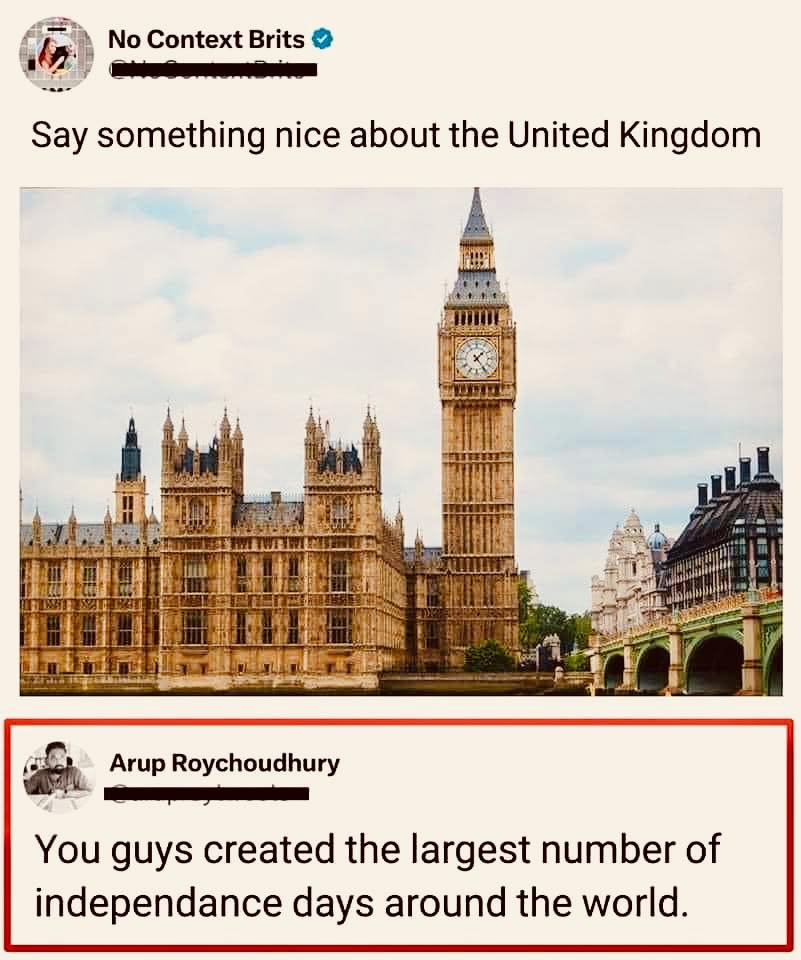this post was submitted on 02 Sep 2024
1290 points (98.5% liked)
memes
9806 readers
2 users here now
Community rules
1. Be civil
No trolling, bigotry or other insulting / annoying behaviour
2. No politics
This is non-politics community. For political memes please go to [email protected]
3. No recent reposts
Check for reposts when posting a meme, you can only repost after 1 month
4. No bots
No bots without the express approval of the mods or the admins
5. No Spam/Ads
No advertisements or spam. This is an instance rule and the only way to live.
Sister communities
- [email protected] : Star Trek memes, chat and shitposts
- [email protected] : Lemmy Shitposts, anything and everything goes.
- [email protected] : Linux themed memes
- [email protected] : for those who love comic stories.
founded 1 year ago
MODERATORS
you are viewing a single comment's thread
view the rest of the comments
view the rest of the comments

It's really sweet how they add unnecessary letters to feel all fancy about their little words.
"Colour"
"Humour"
Aww, so cute.
It gets worse- "foetus," "aeroplane."
They also think "er" is pronounced "re" like in the words "centre" and "theatre" and "s" is pronounced like "z" like in words like "apologise" and "realise."
Get it together guys. We know you came up with the language, but that's no excuse not to keep up.
Speaking of aviation, I have no idea why Americans use such a boring term as "airport". I mean, the guys invented half of the aviation technology and then they just use the term "airport". Such a waste of potential.
The international standard term is "aerodrome". Say it like you mean it. It's a term with gravitas.
Foetus is a weird one, I've never heard that before. I keep trying to pronounce it in my head but the closest I get is sounding like fajitas.
Would you like some chicken ~~fajitas~~ foetus
It comes from the german Fötus
oe is ö
and english is a germanic language
Is that right? So it's not the same as the oe in phoenix? I know in old books they used to fuse the letters.
If it’s right I’d want a source, the oe spelling in British English is as far as I was aware a let’s latinize thing in Britain.
https://www.etymonline.com/word/oe https://www.etymonline.com/word/fetus
Because Fetus would be pronounced with a hard e not a ee sound.
~~oe is a variant of the french œ pronounced ee~~
Ok, I’m confused by the aeroplane reference. It’s not pronounced as per the American “airplane”.
This is the first I'm hearing about these And they bug me
The USA newspapers are credited with removing letters. It used to cost per letter, so people started removing whatever they could.
Noah Webster dropped the 'u' on words as well as otherwise changed the spelling of many words in 'American' English.
Words are changed when their commonly changed... webster took note. Lol
Nah, Webster really did drop the 'u' and changed a lot of spelling. He also learned a lot of languages since back then there were many, many different languages/dialects in America at the time and he wanted to make it easier as he changed spellings, such as swapping 're' to 'er' for phonetics. There was also a lot of anti-British sentiment at the time of course which certainly would have motivated acceptance.
Webster is definitely also credited for this in histories and not newspapers outside of anecdotes.
I’d also heard it suggested that the date was written the “British” way, and post civil war was when they started writing them incorrectly.
"it is often assumed that characteristically American spellings were invented by Noah Webster. He was very influential in popularizing certain spellings in the United States, but he did not originate them. Rather [...] he chose already existing options such as center, color and check for the simplicity, analogy or etymology" https://en.m.wikipedia.org/wiki/American_and_British_English_spelling_differences
Either way he didn't change the spellings he popularized them..
"Webster did attempt to introduce some reformed spellings, as did the Simplified Spelling Board in the early 20th century, but most were not adopted."
Edit, I messed up markdown
If we're doing Wikipedia as the sole citation then:
https://en.wikipedia.org/wiki/Noah_Webster#Blue-backed_speller
Furthermore your quote doesn't actually have a relevant citation:
Though in context of the previous paragraph seems to imply that this was an opinion that the wikipedia article came to simply because there was a previous work that argued specifically for 'or' in place of 'our' but again, it appears to simply be their opinion based on an assumption.
"Aluminium" anyone?
Are you buying?
I've been really wanting to make a small forge to melt down some cans
That would be pretty cool, honestly. Probably better than sticking it in the blue bin.
But they're almost all 'iums', changing just one is like finding a fly in a bowl of cereal
Molybdenum, lanthanum, tantalum, platinum, it’s not unique and not all got latinized.
https://www.etymonline.com/word/aluminum
And aluminum was what it was originally spelled as well, at this point it’s not going to change in American English. Even the IUPAC acknowledges it as accepted, it’s been there from the start can we move on past this after 200+ years?
Now let’s hear yanks say “mobile mirror”. You’re too lazy to even pronounce the letters you do have.
Totally normal if you ask me.
Actually can we collectively agree to blame the French for this? It was they who introduced it.
Thats certainly one possible explanation for why Americans chose to simplify the spelling of the words they use.